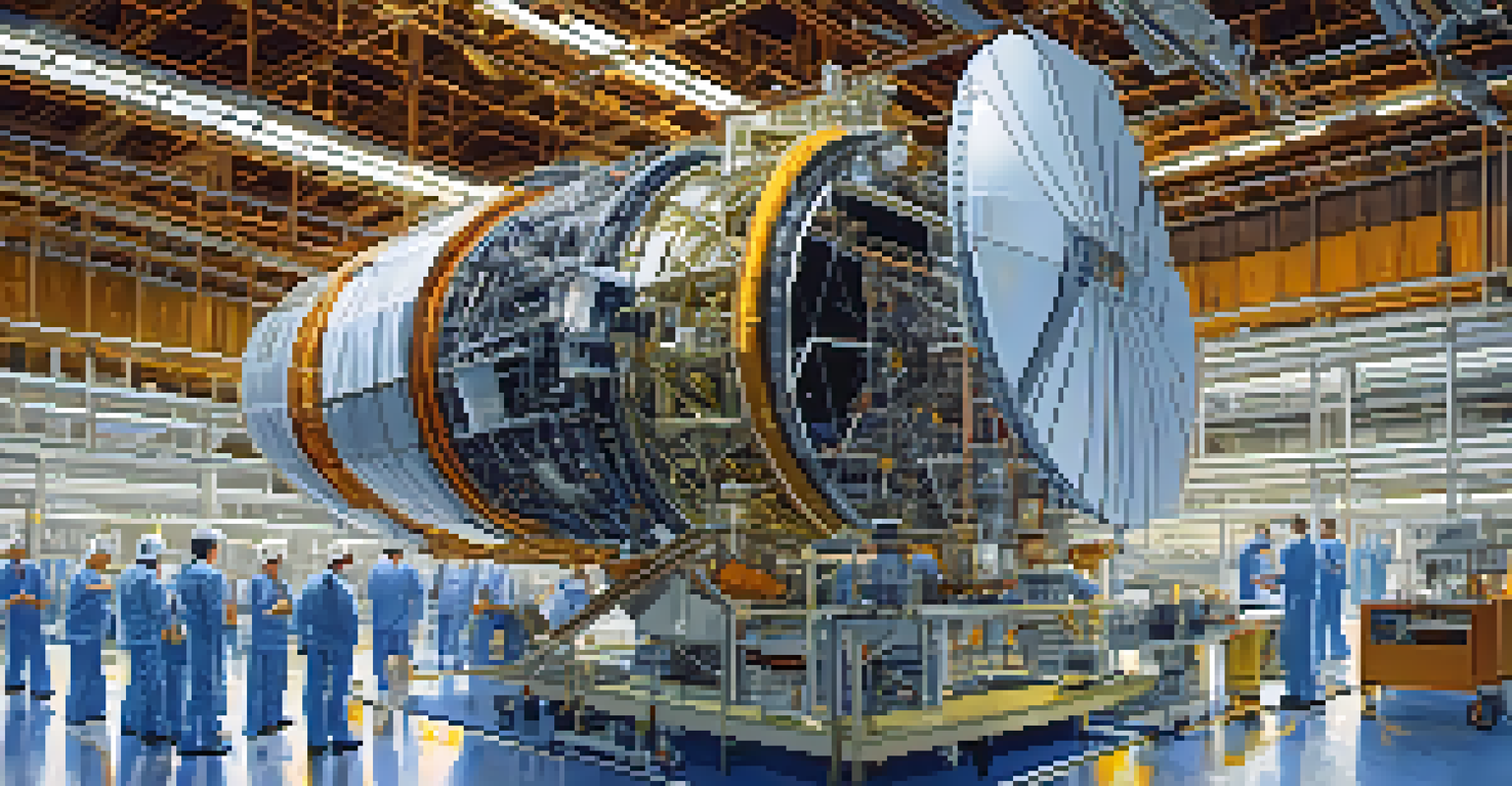The Role of Arizona Universities in Space Research

Introduction: Arizona's Growing Role in Space Research
Arizona has emerged as a significant hub for space research, thanks to its robust academic institutions. Universities in the state are not just educating the next generation of scientists; they are also at the forefront of innovative research and exploration. With a blend of advanced technology and passionate researchers, Arizona's universities are making waves in the field of space exploration.
The important thing is not to stop questioning. Curiosity has its own reason for existing.
The state's unique geography and climate provide an ideal environment for testing space technologies and conducting astronomical observations. For instance, the clear skies of Arizona have made it a prime location for telescopes and observatories. This distinct advantage allows researchers to push the boundaries of our understanding of the universe.
Moreover, these universities collaborate with various organizations, including NASA and private aerospace companies, to enhance their research capabilities. This synergy between academic institutions and industry partners drives groundbreaking discoveries and advancements in space science.
Key Universities Leading Space Research in Arizona
Several universities in Arizona are leading the charge in space research, notably Arizona State University (ASU), the University of Arizona (UA), and Embry-Riddle Aeronautical University. Each institution has its own strengths and focuses, contributing uniquely to the broader field of space exploration. For example, UA is renowned for its planetary science programs, particularly in lunar and Mars exploration.

ASU stands out with its interdisciplinary approach, combining engineering, science, and social sciences to address complex space-related challenges. This holistic perspective fosters innovation and prepares students to tackle real-world problems in space exploration. Meanwhile, Embry-Riddle focuses on aviation and aerospace, providing students with hands-on experiences and industry connections.
Arizona: A Hub for Space Research
Arizona's universities are leaders in space research, driving innovation through advanced technology and collaborations.
These universities not only enhance academic knowledge but also create practical applications that benefit the space research community. Their diverse programs and research initiatives illustrate the collaborative nature of space exploration, where different disciplines come together to achieve common goals.
Innovative Research Projects in Space Science
Arizona universities are engaged in a variety of pioneering research projects that contribute significantly to space science. For instance, the UA's Lunar and Planetary Laboratory has been instrumental in missions to Mars and other celestial bodies, providing critical data for NASA's exploration efforts. Their work includes analyzing samples and developing instruments that may one day be used in future missions.
Somewhere, something incredible is waiting to be known.
At ASU, researchers are focusing on Earth and space observation technologies. They are developing satellites that monitor weather patterns and environmental changes, which have implications not just for Earth but also for understanding other planets. This research is vital in our quest to find habitable environments beyond our planet.
These research initiatives not only expand our knowledge of the universe but also have practical applications on Earth. The technology developed for space exploration often leads to innovations in fields such as telecommunications, environmental monitoring, and even healthcare.
Collaborations with NASA and Private Industry
Collaboration is key in the realm of space research, and Arizona universities are actively partnering with NASA and various private aerospace companies. These partnerships facilitate access to funding, resources, and expertise that enhance research capabilities. For example, ASU's collaboration with NASA has led to significant advancements in satellite technology and planetary research.
Private companies like Boeing and SpaceX are also engaging with these universities to develop new technologies and conduct research. This collaboration not only boosts the local economy but also positions Arizona as a critical player in the growing aerospace industry. Students benefit from internships and job opportunities, making these partnerships mutually beneficial.
Student Engagement Fuels Innovation
Active student participation in research initiatives equips future scientists with practical experience in aerospace.
Through these alliances, Arizona universities contribute to national and global space missions, underscoring the importance of academic institutions in the broader context of space exploration. The impact of these collaborations extends beyond research, fostering innovation that can lead to breakthroughs in various sectors.
Student Engagement in Space Research Initiatives
Student involvement is a crucial aspect of Arizona's space research landscape. Universities offer numerous opportunities for students to participate in research projects, internships, and even hands-on experiments. This engagement not only enhances their learning experience but also prepares them for careers in the aerospace field.
For instance, ASU's space exploration initiatives allow students to work on real projects, such as developing experiments that may be sent to the International Space Station. This kind of practical experience is invaluable, as it equips students with the skills and knowledge needed in a competitive job market.
Moreover, student-led organizations and clubs within these universities foster a community of passionate individuals interested in space. These groups often organize events, workshops, and talks, creating an environment where students can share ideas and collaborate on new projects, further fueling their enthusiasm for space science.
The Importance of Public Outreach and Education
Public outreach and education play a vital role in the mission of Arizona universities involved in space research. By engaging the community, these institutions help raise awareness about the importance of space exploration and its implications for society. Educational programs, workshops, and public lectures make complex scientific concepts accessible to a broader audience.
For example, the UA hosts events that invite the public to observe celestial phenomena through telescopes and learn about ongoing research. These initiatives not only inspire future generations of scientists but also foster a sense of community involvement in space exploration.
Collaborations Enhance Research Impact
Partnerships with NASA and private industry boost resources and opportunities, positioning Arizona as a key player in space exploration.
By promoting science literacy and curiosity, Arizona universities are cultivating a culture that values education and innovation. This investment in public engagement is essential for sustaining interest and support for space research in the long term.
Future Prospects for Space Research in Arizona
The future of space research in Arizona looks promising, with ongoing investments in technology and education. As the aerospace industry continues to grow, universities are likely to expand their programs and research initiatives, attracting more students and researchers to the state. This growth will further solidify Arizona's reputation as a leader in space exploration.
Emerging technologies, such as artificial intelligence and advanced robotics, are expected to play a significant role in future space missions. Arizona universities are uniquely positioned to integrate these technologies into their research, ensuring they remain at the forefront of innovation. Collaboration with industry partners will also be crucial in driving these advancements.

With a strong foundation already in place, Arizona's universities are poised to make even greater contributions to space research in the years to come. The synergy between academia, industry, and the community will continue to drive progress, inspiring future generations to explore the final frontier.